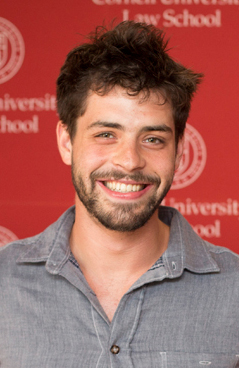Artificial Intelligence and Predicting Tax Evasion

In September, we welcomed Jacob Rosen to Ithaca, NY to present his award-winning research paper, Non-Compliance Detection Using Co-Evolution of Tax Evasion Risk and Audit Likelihood. The LII enjoyed a day of workshops and lively discussion with Rosen and the paper’s lead author, Erik Hemberg, regarding their work, its implications on tax policy, and how it relates to what we’re doing in the legal tech world. The day culminated in Rosen’s public presentation to over 100 attendees (physical and virtual) from disciplines ranging from law and economics to applied mathematics and computer and information science.
*For those who missed our showcase of their research, since covered by the New York Times and TaxProf Blog, the video of Rosen’s presentation is still available for viewing on our website.*
As the U.S. tax code becomes increasingly complex, particularly in the realm of partnership taxation, various laws are often implemented without considering their effects on the overall tax system. Such laws not only create confusion among well-meaning taxpayers, but can be exploited by highly paid tax professionals in order to create perverse results not anticipated by policy-makers. To get an idea of an impact scale, Rosen and Hemberg’s team cites a May 2014 Government Accountability Office report, which claims that taxpayers underreported more than $91 billion of income annually between 2006 and 2009 through the use of partnerships and other “flow-through entities.” It’s an upward trend that shows little sign of stopping.
By representing partnership taxation in a computational model, Rosen and Hemberg’s research group at the Massachusetts Institute of Technology (MIT), teamed with The MITRE Corporation, sought to identify the parts of partnership taxation that likely cause the most confusion and potentially abusive activity. In his presentation, Rosen was careful to delineate the difference between tax evasion and tax non-compliance; while much of this activity seems abusive, because it complies with current tax code–which hasn’t caught up to commercial non-compliance tactics–it technically is legal in the eyes of the Internal Revenue Service.
Their paper received the Peter Jackson Award for Best Innovative Application Paper at the 15th International Conference on Artificial Intelligence and Law (ICAIL) in June 2015, and has gained traction in the press after visiting Cornell this fall. Rather than go further in-depth here, we recommend either reading the paper, visiting The STEALTH (Simulating Tax Evasion And Law Through Heuristics) Project website or watching Rosen’s presentation, as he is far more capable of communicating their complex research methodology.
—
Jacob Rosen, S.M. is a Modeling and Simulation Engineer in the MITRE Corporation’s Interdisciplinary Modeling Division, where he develops computational techniques to detect and characterize financial fraud. He earned his Master of Science in the Technology and Policy program at Massachusetts Institute of Technology (MIT), where his research within the Anyscale Learning For All (ALFA) group at MIT’s Computer Science and Artificial Intelligence Laboratory (CSAIL) focused on the abstract representation of financial transactions and artificial intelligence techniques. He earned a Bachelor of Science, concentrating in Mathematics and Economics, from the University of Michigan in Ann Arbor.
Dr. Erik Hemberg, Ph.D is a Translational Fellow in the Innovation Initiative at the MIT, where he also did postdoctoral research in the ALFA group in CSAIL. He performs research regarding scalable machine learning. He is currently involved in research regarding tax evasion and physiological time series prediction. Dr. Hemberg received his Ph.D in Computer Science from University College Dublin, Ireland.
This event was made possible by the Legal Information Institute (LII), the department of Information Science (IS) Colloquium, the Law School Alumni Association and The MITRE Corporation.


